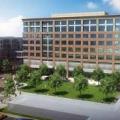growth
{Cross posted from the Chapel Hill News}

A picture of a stop sign graffitied to read “STOP PROGRESS” appeared on Twitter last week. The person who Tweeted it captioned it simply: “Chapel Hill politics in a nutshell.”
A few days later, a community leader expressed to one of us their disappointment in how our community is perceived. “People used to look to us as a leader in innovative policies, a place where cool things were happening. That doesn’t happen anymore.”
How we got to this point is no mystery. Past local elected officials enacted policies that made it difficult to open new businesses and build new kinds of housing. As a result, most development of the past few decades has been low-density, single-family homes on dead-end streets.
An article in the Chapel Hill News on Sunday gave me pause on the candidates for the Chapel Hill town council. When asked to speak on town spending, all resorted immediately to either vague plans for reductions or, astonishingly, proposals to charge for transit, which is by far the most effective service Chapel Hill offers.
Instead of deciding which items to cut, the candidates for the council should commit to a pro-growth agenda. Rezone the entire downtown core as TC-3-C, and consider removing the height cap for downtown. Allow people to build along the planned light rail corridor to Durham. Expedite the review process so every proposal doesn't get dragged down in years of bickering.
At last night's Chapel Hill Town Council meeting a decision was put off regarding the Town Manager's recommendation to move forward and issue the voter-approved bond for the Library expansion. There were two major issues. First, the anticipated operating expenses for the expanded Library would result in a tax rate increase of $0.0113. This would add about $34 to the tax bill of a homeowner with an appraised house value of $300,000. Second, several Council members were concerned about moving forward until Orange County commits to a more equitable funding of the Library since 40% of the users and 40% of the circulation is by Orange County, non-CH residents.
For ten years, discussions between the Inter-Faith Council, the Town of Chapel Hill, and the University of North Carolina have been underway to relocate the men’s shelter and community kitchen. Many factors were considered during the deliberations, and with great generosity a site along Martin Luther King jr. Blvd. was donated by the University. So an ideal site found but so was a new obstacle; fear.
With the rollout of Raleigh's plan for future development and identification of areas for transit and denser development, this topic is as timely as ever for our communities. NRG is seeking to initiate a public discussion about a comprehensive vision for the future of Chapel Hill. We are hoping to engage citizens to learn more about this issue and to equip them to weigh in with their elected officials on how they want to see their community grow.
I hope OP readers will join us and lend their opinions, questions, and experience. While the forum addresses primarily Chapel Hill, this issue is not confined to one town - we hope to attract attendees from our wider community to bring their expertise and perspectives. For details on when and where, please see the invitation below.
Chapel
Hill 2020: A Forum on the Future of Density
and Growth in Chapel Hill
Wednesday,
December 10, 7 – 9 pm
Pages
About Us
OrangePolitics is a not-for-profit website for discussing progressive perspectives on politics, planning, and public policy in Orange County, NC. Opinions are those of their authors. Learn more.
Community Guidelines
By using this site, you agree to our community guidelines. Inappropriate or disruptive behavior will result in moderation or eviction.
Zircon - This is a contributing Drupal Theme
Design by
WeebPal.


